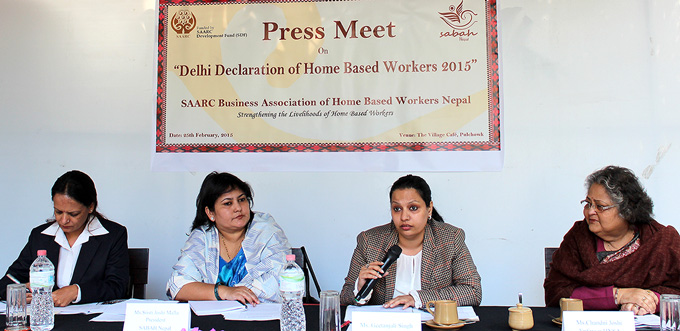Remarks by Gitanjali Singh, Deputy Representative, UN Women
on the press meet organized by SABAH Nepal for home based workers.Date:

Chandniji, Joint Secretary Ms. Aryal, Sristiji, Babitaji,
Members from the home-based workers network,
Friends from the media,
Distinguished Guests,
Namaste and Good Afternoon,
I am very pleased to join you all today at this press meet, organized by SABAH, to share the recently adopted Delhi Declaration on Home Based Workers. Highlighting some very important themes, including social protection, decent work and participation, the Declaration is a very positive and welcome outcome of the Global Conference on Home Based Workers, held in New Delhi, earlier this month.
UN Women has travelled the journey with the home based workers in the region (including Nepal) and has supported their efforts since 1996. We have supported the establishment of national networks in Bangladesh, India,Nepal, Pakistan and Sri Lanka and also their efforts to engage in policy advocacy on key issues, such as social protection, fair trade practices, mutual learning and capacity development.
Today, there are over 100 million home-based workers across the globe, with about 50 million of these living in South Asia – and many in Nepal. Over 80 per cent of these are women[1]. Often women from rural, marginalized and economically impoverished backgrounds, home-based workers remain among the economically most vulnerable groups of women, with limited representation or access to social security available to other workers in the economy. Prioritising work with vulnerable groups, such as home-based workers, is crucial for women’s economic empowerment and women’s ability to contribute to inclusive and sustainable growth.
We know from global evidence that investing in women’s economic empowerment is not only a moral imperative; it is common sense and also smart economics. Women’s participation in the economy has a multiplier effect on economic growth, as a result of the 50 per cent improved talent pool. It also strengthens social cohesion and well-being of families and communities. Women with a stable income are better able to take care of their families, and make positive decisions for themselves and their families. In short, it helps break intergenerational cycles of poverty, discrimination and and exploitation
UN Women looks forward to collaborating with networks of excluded women, including home-based workers, SABAH, and the Government to continue to advance women’s economic empowerment in Nepal. Inclusive and sustainable growth can be achieved only if women are economically empowered to participate and benefit from it.
Thank you.
About Home Based Workers
Of the over 100 million home-based workers (HBWs) in the world, half are in South Asia alone, of which, almost 80% are women.
There is growing unemployment in the South Asian countries, and the organized sector has been unable to provide job opportunities to a large number of persons who join the labour force each year. However, as a workforce, home-based workers are largely invisible, vulnerable to exploitation and are excluded from the benefits of economic growth.
For example: Policy advocacy on home-based workers has shown very tangible results.
- UNIFEM’s (now UN Women) support over the years has led to the establishment of national networks – Home Nets in Bangladesh, India, Nepal, Pakistan and Sri Lanka, as well as a regional network, HomeNet South Asia (HNSA), in 2007.
- UNIFEM (now UN Women) has supported HNSA and the national Home Nets in their efforts to engage in advocacy on key issues, such as social protection, fair trade practices, mutual learning and capacity development.
- In all the countries, there is now an enabling environment for policy change and dialogue on home-based workers. UNIFEM (now UN Women) is supporting the formulation of National Policies for home-based workers, and has played a key role in promoting their visibility as workers in the Census exercise.